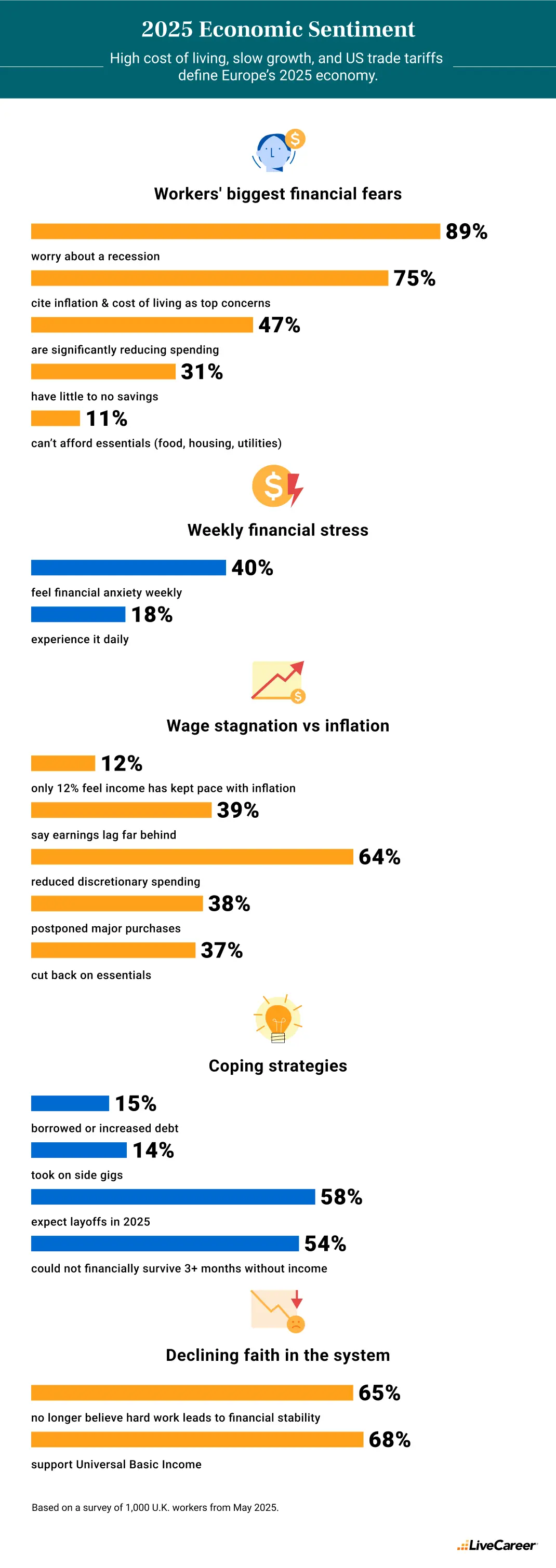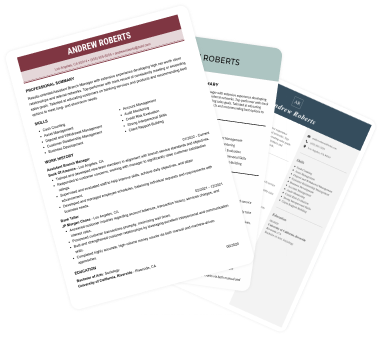
20 Signs of a Toxic Work Environment & How to Spot Them
How to spot the top signs of a toxic work environment before it's too late? Read our guide and discover 20 workplace red flags you should watch out for!
January 29, 2026
Last updated on 29 January, 2026

Our customers have been hired by*:
The high cost of living, slow economic growth, and U.S. trade tariffs all contribute to a rather bleak picture of the current European economy. How does this challenging economic landscape influence the lives of ordinary people? LiveCareer surveyed 1,000 workers to learn about their financial and work situations.
Key insights:
In the UK, inflation remains the defining issue of 2025. This aligns with broader European trends, as real wages across the Eurozone have failed to keep pace with inflation for the fourth consecutive year.
LiveCareer asked workers what concerns them the most about their financial future in 2025:
With only 5% reporting that they are financially better off than they were a year ago, the survey results show that the labour force is facing economic uncertainty. The worries don’t stop here—nearly 9 in 10 UK workers are worried that trade conflicts and tariffs will push prices even higher. Additionally, 40% of respondents said they felt financial anxiety every week, and 18% experience it daily.
While data published by the House of Commons Library shows that average weekly earnings in the U.K. increased by 5.2%, workers don’t feel optimistic about their wages. LiveCareer’s survey found that only 12% of UK workers believe their income has kept pace with inflation, while 39% say their earnings haven’t kept up at all.
In their responses, European workers admit that they’re forced to live frugally:
Inflation puts workers in a vulnerable position, as some are turning to debt or the gig economy to stay afloat. Roughly 15% have borrowed money or increased debt, and 14% have taken on extra work. While these might be reasonable temporary measures, in the long term, they can cause significant stress for the labour force.
There are even more reasons to be alarmed, as the average European worker doesn’t feel optimistic about the year ahead. Many expect the worst: 89% of respondents say they’re concerned about a recession this year. Additionally, over half (58%) expect layoffs to increase—a terrifying prospect for 54% of respondents, who admit they couldn’t survive over three months without income.
The topic of layoffs is closely tied to the rise of AI and automation, which is yet another contributing factor to worker anxiety: 42% of respondents are concerned that new technologies will negatively impact their jobs within the next three to five years. At the moment, it’s unlikely that the labour force will prepare for these changes, as only 9% of surveyed workers are pursuing formal education or certifications, and 17% say they’d like to retrain but can’t afford to.
Disillusionment is the prevailing sentiment among European workers, and the belief that hard work leads to financial stability is gone. When two-thirds (65%) of respondents no longer believe in this traditional economic promise, it’s no wonder that 68% support the idea of a Universal Basic Income. The labour force is also unlikely to sacrifice their personal lives to pursue better work opportunities: 71% of UK respondents said they wouldn’t relocate for a better-paying job.
The findings from LiveCareer’s survey are consistent with other studies that indicate a widespread dissatisfaction with the economy. What’s even more alarming than the current state of mind of workers? The risk of long-term health consequences that economic anxiety may cause. Research has shown clear links between economic decline and worsening mental health, and this should be enough of a reason for European governments to sound alarm bells.

This LiveCareer report is based on a survey of 1,000 U.K. workers conducted in May 2025. The survey participants were screened to ensure they were actively employed at the time of the study, and they represented a broad cross-section of the working population. The sample included 52.17% female respondents (530) and 47.34% male respondents (481), with a balanced age distribution: 18.31% were aged 18–27 (Gen Z), 27.66% were aged 28–43 (Millennials), 27.17% were aged 44–60 (Gen X), and 26.87% were aged 61–79 (Baby Boomers).
Our editorial team has reviewed this article for compliance with LiveCareer’s editorial guidelines. It’s to ensure that our expert advice and recommendations are consistent across all our career guides and align with current CV and cover letter writing standards and trends. We’re trusted by over 10 million job seekers, supporting them on their way to finding their dream job. Each article is preceded by research and scrutiny to ensure our content responds to current market trends and demand.
Category: Career Advice
Crafting a job-winning CV is all about showcasing your unique skills and experiences. Start with a strong personal statement that highlights your career goals and achievements.
Try Our CV Builder Now